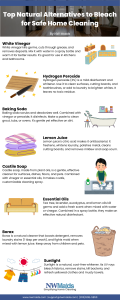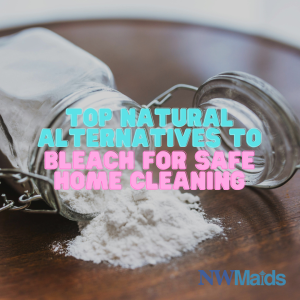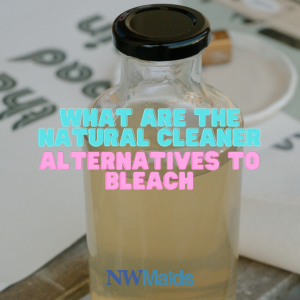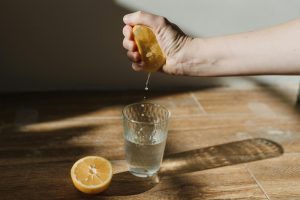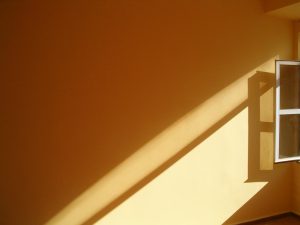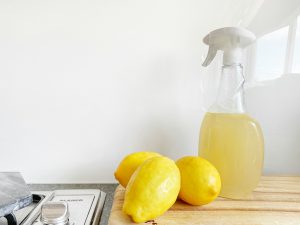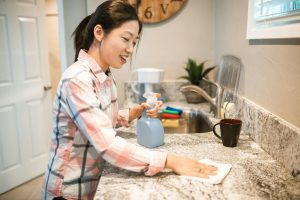The strong disinfectant properties of bleach come with dangerous side effects that irritate skin and eyes, and lungs, while causing harm to the environment.
Natural cleaning products exist that deliver similar cleaning effectiveness without the toxic risks.
The alternatives offer safe, sustainable cleaning power for surface disinfection, laundry whitening, and mold removal.
Why Choose Natural Over Chemical?
The choice of natural cleaning solutions protects you from dangerous fumes and toxic residues.
Bleach substitutes are made from biodegradable materials, which provide non-toxic solutions that are safe for children and pets.
The products are suitable for individuals who experience allergic reactions, providing a gentler treatment for your home surfaces and textiles.
What are the Natural Cleaner Alternatives to Bleach
White Vinegar
White vinegar serves as a basic natural cleaning ingredient because of its distilled state.
The germ-killing properties of acetic acid work alongside grease-cutting abilities and mineral deposit-dissolving powers.
Combine equal portions of vinegar and water to create a cleaning solution in a spray bottle. Warming the solution will increase its effectiveness when applied to surfaces.
This substance proves especially useful for fighting bacteria in kitchens and bathrooms.
Hydrogen Peroxide
The mild antiseptic hydrogen peroxide found in medicine cabinets serves as both a disinfectant and a whitening agent at a concentration of 3%.
This disinfectant serves as an effective substitute for bleach when you need to clean cutting boards, sinks, and toothbrushes.
You can use hydrogen peroxide to sanitize surfaces by spraying it directly or to brighten your white clothes by adding a cup to your wash.
The decomposition of bleach produces only oxygen and water, which means no toxic residue stays behind.
Baking Soda
Baking soda works best for scrubbing and deodorizing purposes.
The combination of vinegar or hydrogen peroxide with baking soda enhances its disinfecting properties.
To clean grout, tubs, or oven interiors, create a paste with water, then use a sponge for scrubbing.
The soft scrubbing ability of this material eliminates dirt without harming sensitive materials.
Lemon Juice
The antibacterial properties of lemon juice stem from its citric acid content.
Natural cleaning products often include lemon juice because it provides a pleasant fragrance and eliminates unpleasant odors.
Use lemon juice as a whitening agent in laundry (add ½ cup to the rinse cycle) and for metal polishing and wooden cutting board cleaning.
The substance proves particularly successful in combating both mildew and soap scum.
Castile Soap
Castile soap made from plant oils functions as a mild yet efficient cleaning solution for all types of surfaces.
Mopping floors, washing dishes, and pet cleaning become possible tasks with this soap.
The combination of Castile soap with vinegar or essential oils allows you to create customized cleaning sprays that effectively eliminate dirt while maintaining safety in sensitive areas.
Essential Oils
The antimicrobial compounds found in tea tree oil, along with lavender oil, eucalyptus oil, and lemon oil, make them suitable for use as disinfectants.
When you add these essential oils to water or vinegar cleaners, they increase germ-killing effectiveness while adding a pleasant scent to the mixture.
The combination of tea tree oil and water, and vinegar in a spray bottle creates a disinfectant spray that works effectively.
Borax
Borax works as a natural cleaning enhancer when used in combination with detergents.
Borax provides a safe cleaning solution when handled properly; however, it should be stored out of reach of children and pets.
Borax serves as a laundry stain remover when used in small quantities (1 tablespoon per wash), and it also fights bathroom mold and mildew when mixed with lemon juice.
Sunlight
Sunlight stands as the oldest natural whitening solution, which costs nothing.
Outdoor sun exposure enables white laundry to remove stains while simultaneously killing bacteria and eliminating odors.
The ultraviolet rays of sunlight effectively bleach fabric materials, especially those made from cotton and linen.
The sun’s ultraviolet rays perform a natural bleaching effect on fabrics, which works best on yellowed clothing, as well as musty towels.
Washing Soda
The cleaning agent known as washing soda and sodium carbonate proves superior to baking soda when used to remove stains from laundry and clean greasy cookware and soap scum.
The substance makes water softer, which enhances detergent performance and enables the effective removal of dirt from surfaces.
This substance works best in hot water to create a strong soaking liquid and also functions as a laundry stain treatment before washing.
Cornstarch
The cleaning property of cornstarch lies in its ability to produce a perfect shine on windows and stainless steel surfaces.
Combine it with water and vinegar to create a glass-cleaning solution that produces a streak-free finish when applied.
The powder functions as a fabric and carpet stain absorber for oil and grease.
After placing the cornstarch on spills, wait until it sets before using a vacuum to remove the remaining residue.
Clove Oil
Clove oil stands as a highly effective agent that prevents mold growth.
A spray bottle containing only a few drops of clove oil mixed with water becomes a powerful tool for fighting mildew in bathroom areas and damp corners.
After applying the solution, wait until it dries before scrubbing the surface with a brush.
The surface becomes mold-resistant, while its strong scent disappears after drying.
Oxygen Bleach
Oxygen bleach products, which operate under OxiClean brand names, among others, contain sodium percarbonate that produces hydrogen peroxide when dissolved in water.
The product both whitens clothing while removing stains and disinfects surfaces without requiring toxic chemical agents.
The product works on all colors of fabric and serves as a preferred option for those who need bleach power without chemical hazards.
Salt
Salt has been used for centuries as a cleaning aid.
The abrasive quality of coarse salt helps users remove wine stains from fabric and clean cast-iron pans.
The combination of lemon with salt produces an effective solution for cleaning tarnished copper as well as stained cutting boards.
The desiccating properties of salt help extract moisture from moldy areas to minimize fungal development.
Build a Natural Cleaning Kit
To go bleach-free at home, you need white vinegar, along with baking soda, hydrogen peroxide, Castile soap, and essential oils.
Using reusable spray bottles, along with microfiber cloths and scrub brushes, helps you establish a zero-waste cleaning practice that benefits your health and the environment.
Conclusion
Using natural bleach alternatives does not compromise your ability to achieve a clean environment.
You can achieve disinfecting, deodorizing, and brightening results through proper ingredient selection, while avoiding fumes, skin irritation, and environmental harm.
The fresh environment, combined with cleaner air and an untroubled conscience, awaits you.
Need Help Keeping It Clean?
NW Maids provides professional house cleaning services to clients seeking expert cleaning solutions.
Our team uses environmentally friendly products while performing home cleaning services to maintain your home’s cleanliness without endangering your family members.
Our company offers comprehensive deep cleaning services and customized scheduled cleaning plans tailored to meet your specific needs.
Related Posts:
- Room-by-Room Decluttering Plan to Transform Your Living Space
- Complete Guide to Cleaning and Disinfecting a Home Gym
- Back-to-School Cleaning Hacks Every Parent Should Know
- Where You Should Be Cleaning More Often in Your House
← Where You Should Be Cleaning More Often in Your House
What Cleaning Supplies You Actually Need (And What to Skip) →
